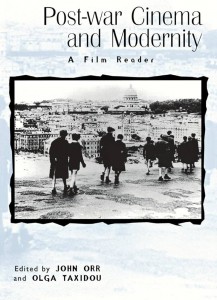Post-war Cinema and Modernity
A Film Reader
Edited by John Orr and Olga Taxidou


Average rating: ![]()
| 0 | rating | |
| 0 | rating | |
| 0 | rating | |
| 0 | rating |
Your rating: -
Book Presentation:
Post-war Cinema and Modernity explores the relationship between film and modernity in the second half of the twentieth century. Its distinguishing feature is the focus on the close connections between history, theory and textual criticism.
The first section, on Film Theory and Film Form, begins with a sustained group of theory readings. Bazin and Telotte critique new post-war forms of film narrative, while Metz and Birch respond to the filmic innovations of the 1960s and the question of modernism. Pasolini's landmark polemic on the cinema of poetry is a vital springboard for the later critiques by Deleuze and Tarkovsky of time and the image, and for Kawin and De Lauretis of subjectivities and their narrative transformation, while Jameson deals with the topical question of film and postmodernity. There follows a series of essays grouped around different aspects of film form. General discussion of changes in film technology and cinematic perception can be seen in the essays by Virilio, Wollen, Aumont and Bukatman, and is extended to a discussion of film documentary. Finally, there is a focus on cinematographers and their filmic collaboration, with a specially commissioned essay on post-war British cinematography, and readings featuring the work of Michael Chapman with Martin Scorsese and Nestor Almendros with Terrence Malick.
The second section looks at International Cinema, placing filmmaking and filmmakers in a social and a national context, as well as taking up many aspects of film theory. It brings together landmark essays which contextualise feature films historically, yet also highlight their aesthetic power and their wider cultural importance. Filmmakers discussed include Ozu, Bresson, Hitchcock, Godard, Fassbinder and Zhang Yimou. There is a new translation of Kieslowski's essay on Bergman's The Silence and an essay specially commissioned for the volume on the work of Theo Angelopoulos.
Key Features
• Filmmaking and filmmakers are placed in social, national and historical context
• The selections address many aspects of film theory and film form
• Topics include Film and Narrativity, Representation and Reflexivity, Time and the Image, Subjectivity and Perception, Film and Painting, Gender and Identity
• Readings on individual directors - Welles, Antonioni, Rocher, Sembene, Greenaway and Egoyan
> From the same authors:
The Demons of Modernity (2016)
Ingmar Bergman and European Cinema
by John Orr
Subject: Director > Ingmar Bergman
The Cinema of Roman Polanski (2006)
Dark Spaces of the World
Dir. John Orr and Elżbieta Ostrowska
Subject: Director > Roman Polanski
The Cinema of Andrzej Wajda (2004)
Dir. John Orr and Elżbieta Ostrowska
Subject: Director > Andrzej Wajda
> On a related topic:
Cinematic Modernism and Contemporary Film (2024)
Aesthetics and Narrative in the International Art Film
by Howard Finn
Subject: Theory
The Moving Form of Film (2023)
Historicising the Medium through Other Media
Dir. Lúcia Nagib and Stefan Solomon
Subject: Theory
The Crisis of Political Modernism (1995)
Criticism and Ideology in Contemporary Film Criticism
Subject: Film Analysis
The Attractions of the Moving Image (2025)
Essays on History, Theory, and the Avant-Garde
by Tom Gunning
Subject: Theory
Contemporary Screen Ethics (2025)
Absences, Identities, Belonging, Looking Anew
Dir. Lucy Bolton, David Martin-Jones and Robert Sinnerbrink
Subject: Theory
Cinecepts, Deleuze, and Godard-Miéville (2025)
Developing Philosophy through Audiovisual Media
Subject: Theory